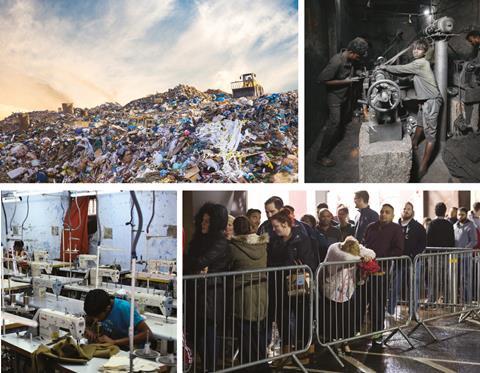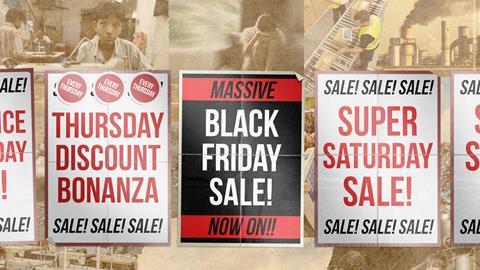A relative newcomer to the UK, Black Friday is now the biggest retail event of the year. But is it a flagrant celebration at the altar of mammon or a legitimate way for businesses to drum up trade? And how, asks Jonty Langley, should Christians respond?
She’s been queueing since the early hours outside the shop and people keep on pushing in. She doesn’t tut under her breath - she not in the UK - but calmly walks up to queue jumpers and unleashes enough pepper spray to send several of them to the hospital. It’s not really how we British would do it, but this is America. And this is Black Friday.
Black Friday is one of those imported American events that many Britons tend to resent, like trick-or treating at Halloween or having to stay up all night with friends to watch the Super Bowl. It traditionally falls on the Friday after Thanksgiving, and it has become known as the day when people queue and fight and grotesquely consume in the apparent worship of stuff. I say ‘traditionally’, because, despite what many think, Black Friday has been around since 1869 according to some sources, and at least since the 1950s.
Today it is the centre of an ever expanding nexus of special offers that most of us would traditionally associate with the Boxing Day sales – but Black Friday has now eclipsed that celebration of selling. What started off in the USA has become a familiar British phenomenon: traffic jams and irritable throngs of people seemingly consumed by consumption, driven by a mania to buy, buy, buy, worthy of the most obsessive NSYNC fan. A day when insane deals and discounts breed a kind of madness in the shopping public, leading them into debt, disorder and distress.
FINDING THE BALANCE
While more harrumph-prone Britons might resent our adoption of yet another American observance, many Christians think that what is at the heart of Black Friday is more damaging than cultural encroachment: a consumerism that is neither godly nor good for the world. The argument is simple: a day when we are all encouraged to spend more than we can afford (on acquiring things we don’t need) cannot be spiritually healthy. In short, it must accelerate all the terrible things that overconsumption causes the rest of the year, from sweat shops and plastic waste to materialism, anxiety and industrial levels of carbon being pumped into the atmosphere.
But Black Friday is also a day (or, if you’re Amazon in 2021, more than a month) when businesses can drive more sales than any other time of year, pushing many out of the red and back into the black. While this is not its true origin, the name Black Friday has come to be associated with the idea of supporting business and stimulating the economy. Where you stand on this will depend on your theology, your politics and quite possibly how much you’d like to buy a new TV or pair of trainers without breaking the bank.
You might break your nose, of course, if you get involved in one of the Black Friday fights that have become more common over the last few years in this country. And Christians might rightly ask whether anything with this level of mayhem associated with it can possibly be good. But, then, if disorder is our main measure of these things, Christians couldn’t really defend protests like Black Lives Matter or Insulate Britain occasionally getting out of hand. But neither can more conservative Christians, who think protests that turn violent are illegitimate, defend the existence of the powerful capitalist engine that is Black Friday.
IT’S NOT JUST THE SHOPPERS WHO MIGHT BE ACCUSED OF WORSHIPPING MAMMON, BUT THOSE OFFERING THE DEALS
The point being that evaluating Black Friday based on the unrest it leads to is unlikely to help us understand whether it is a good, bad or neutral thing.

LOOK MORE CLOSELY
The problem with Black Friday is not people being impolite to each other, or even the occasional outburst of violence. Anyone who has been on the street at chucking-out time knows that concentrations of humans with their inhibitions eroded (by drink or desperation for that deal) will usually result in people rubbing each other up the wrong way. You can’t write off all pubs, football matches or political protests just because people under pressure tend to be a bit awful. And who among us, after a long day of shopping, hasn’t contemplated violence?
If there is anything wrong with Black Friday, it is only what is wrong with our society the rest of the year. Black Friday is just the moment, annually, when we see it more clearly.
In Welsh, it’s called Silly Spending Friday, and that captures it perfectly. You cannot reasonably hate Black Friday if you are fine with a global economy that demands infinite growth on a finite planet and ever more consumption by people who (by any historical standard) have more than they could possibly need.
Let’s be honest. Few of us need to buy new wardrobes, new cars, new kitchen units, gadgets or mobile phones every year. It’s silly spending. Our buying of things we don’t need and discarding them in favour of newer, slightly different versions of the same thing every season (and the throwaway culture that goes with it) is demonstrably bad for the planet and for its poorest, who are often the ones producing what we consume, their low wages supporting our low prices.
That’s why so many Christians (and other people of conscience) have turned to ethical shopping, low-waste living and the renewing of their minds by opting out of festivals of acquisition and their endless advertising drone (see box).
But does this mean we should judge those who still participate?
No.
CHOICE IS PRIVILEGE
It’s easy to tut and say: “How shallow!” at the annual scenes of retail insanity that Black Friday brings. It’s easy to write off the desire to get a new gaming console or smart watch on the cheap as greed and materialism. Sometimes these are at play, for sure. But if you know your children have been brainwashed into wanting these things by the relentless and all-pervading barrage of branding messages – or if they just want to be part of their culture and play with their friends – then not caring about the deals in late November is less about ethics than it is about privilege.
IF YOU’RE JUDGING PEOPLE FOR NOT BEING AS ETHICAL AS YOU, THAT’S NOT RIGHTEOUSNESS, IT’S SPARKLING SELF-RIGHTEOUSNESS
Judging people for queueing for deals is, ironically, cheap. As has often been said, not caring about money is easy when you’re rich.
That doesn’t mean that there is nothing wrong with Black Friday and its offered cornucopia of things that rust and that moth will destroy (see Matthew 6:19-20, ESV). It means that, while we refuse to be conformed to the sometimes desperate, greedy thinking of this world, we must not avoid the sin of greed by falling into the sins of self-righteousness and judgementalism.
After all, it is not just the shoppers who might legitimately be accused of worshipping mammon on Black Friday, but those offering deals and driving ever-greater profits regardless of the cost to the earth or God’s children in it. I’m not calling all Amazon employees idolaters or suggesting the people behind the counter at Currys are running a coven by the ovens. But if there is mammon worship going on, it is less about the people than the structures, ideas and systems at play. And these, I think, must be opposed.
For Christians, our battle is very rarely “against flesh and blood”, as it says in Ephesians 6:12. But in a world where governments and populaces serve markets and economies rather than the other way around, is it that unreasonable to see corporate interests that can dictate the tax they pay as ‘rulers’? Are trading areas not ‘principalities’ of a kind? And isn’t a world where the rich get richer by the very same mechanisms that destroy creation and exploit the poor not legitimately to be thought of as ‘dark’?
We must not delude ourselves with the comforting fiction that if we buy enough Fairtrade coffee, the world will be set to rights
A BETTER WAY
Those who truly follow Christ do not have the luxury of hating our enemies. But we do have a duty to be stewards of the world (as we learn in Genesis) and to follow Jesus’ lead in proclaiming “good news to the poor”, freedom to prisoners and sight to the blind, and by setting “the oppressed free” (Luke 4:18). This might mean we have a duty to open the eyes of the poor diving deeper into debt and to help free those imprisoned by manufactured and artificial desires for things they neither need nor really want. We are called to change culture, I believe, but not to judge those who participate in it. Particularly those oppressed by structures that keep them hopeless. Following Jesus in this way might be bad for business.
Then again, it might not. Never before have there been so many opportunities, aggregators, indices and directories of ethical businesses, local businesses, small businesses and social enterprises. You don’t have to be a raving communist to recognise that not all businesses are created equal and that some are more deserving of our support than others. God has blessed us in this time with ways to do less harm with our consumption.
But in this, again, we must be careful. Woke judgementalism is just as bad as generalised common or-garden judgementalism. If you’re judging people for not being as ethical as you, that’s not righteousness, it’s sparkling self-righteousness. And it achieves the opposite of what you’re hoping for because, in the end, the objects of your scorn are less likely than ever to follow your example.
And even if they do, what then? Even if every Christian sweetly showed a better way, would all humanity turn to ethical sources? No. There is evil in the hearts of men and women, and there is weakness in us too. But we also live in a fallen world that has organised itself in such a way that most of our economies rely heavily on people who simply do not have the economic freedom to choose the better, but more expensive, option.
A HARD REVOLUTION
So, we must proclaim freedom for them. We must vote and campaign and fight non-violently for their liberty, as passionately as we would support any other freedom dear to our hearts. And we must not delude ourselves with the comforting fiction that if we buy enough Fairtrade coffee and artisanal vegan shoes, the world will be set to rights.
It is going to take more than that. Some would say a revolution. I would say a miracle. So it’s a good thing that we believe in miracles. But most miracles start with a humble recognition of our powerlessness and our need for God’s help and intervention.
We in the West and North consume too much. More than our fair share. We need to do better, and that means we must take less. I say this as a fat man with a petrol car. I say it as a sinner who wants to do better and who doesn’t believe having stuff is evil. But if Black Friday shows us anything, it shows that stuff and the love of it (like the love of money at the heart of our economic system) is the root of at least some evil (1 Timothy 6:10). So, when we are faced with a choice between keeping things, at a systemic level, as they are or changing them for the better in a way that will leave us with less, we need to have the courage of our best convictions.
If we agree with Jesus that bursting barns are foolish things in which to place our trust when we are destined for the grave (Luke 12:16-21), we know that our hope is in something bigger. So, when we are faced with a choice between comfortable inaction and sacrificial change, we are going to need God’s help.
This Black Friday, let’s pray for God to make us strong and courageous in our pursuit of justice, good stewardship and freedom for those held captive and oppressed. Let’s make it a Good Black Friday.





































